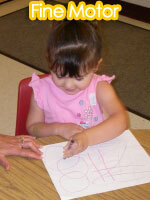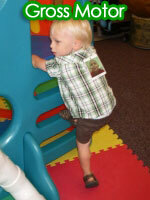Eligibility Guidelines
How is a child determined eligible for Early On?
A child may be determined eligible for Early On due to the presence of either:
- a 20% or greater developmental delay and/or,
- an established health condition that may result in a developmental delay.
Developmental Delay:
With respect to young children, we typically describe development through different domains. Below is a description of the different domains and some sample skills that might be in each developmental area.
Area of Development |
Description |
Example of Skills |
 |
Refers to how your child thinks, reasons and solves problems | Imitates motor actions, figures out how to get things they want, puts shapes in a shape puzzle, sorts objects, searches for objects out of site |
 |
Refers to how your child understands and uses sounds, gestures and language | Turns their head when their name is called, reaches with arms to be picked up, points to indicate needs, follows directions, and says words to tell others what they want |
 |
Refers to how your child uses small muscle movements in the hands and fingers and how the hands and eyes work together | Follows a moving toy with their eyes, reaches and grasps for objects, puts things in/out, colors, does puzzles, copies circle with crayon |
 |
Refers to how your child uses large muscle movements in the trunk, arms and legs | Rolls, sits with out support, crawls, walks, runs throws a ball, goes up and down steps |
 |
Refers to how your child cares for himself with respect to eating, dressing and toileting | Drinks from a cup, finger feeds self, puts arm through shirt, is dry for longer periods of time |
 |
Refers to how your child relates to others, develops his/her sense of self and copes with events in his world | Develops strong bond with caregiver, shows some fearfulness of strangers, separates from caregiver, shows a wide range of emotions, plays along side other children |
Although young children progress and develop at their own rate, development is predictable and many skills occur within a specific time frame. There are assessments that help evaluators determine if a child’s development is like that of his/her same age peers. This progression of typical development is what is used to determine if your child has a delay.
For example, studies of infant development have revealed that most infants by nine months of age are moving towards things by crawling and/or cruising (walking around while holding on to furniture). If a 9 month old is just starting to sit, (which is a skill typically mastered by 6 month olds), then his gross motor skills might be determined to be delayed. This means that when you compare his skills to other children’s skills, his gross motor development is like that of a 6 month old. In this example, the child would most likely be determined eligible for Early On as his delay is greater than 20%. A 20% delay for a 9 month old would be when the child’s skills were at the 7.2 month level.
Sometimes child can be at the appropriate level in one area but have delays in another.
In order to be eligible for Early On, a child must have a delay of 20% or greater in one or more areas of development.
There are many more aspects to the assessment which you can reference in the evaluation section of this website.
Established Conditions:
The State of Michigan has determined that the presence of the following health conditions will automatically make a child eligible for Early On. These conditions must be diagnosed by qualified personnel. If a condition resolves, the child will no longer be eligible for Early On.



